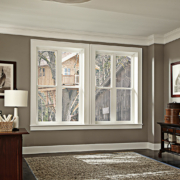What is Offset Glass in Replacement Windows?
Offset glass is a term commonly used in the context of replacement windows. In this article, we will explore the concept of offset glass, its manufacturing process, and its role in enhancing the efficiency and aesthetics of replacement windows. We will also discuss different types of offset glass and the benefits of using offset glass in replacement windows. Finally, we will guide you on choosing the right offset glass for your windows.
Understanding Offset Glass
Offset glass refers to a type of glass that is specifically designed for replacement windows. It is characterized by a unique composition and structure that sets it apart from ordinary window glass. The term ‘offset’ refers to how the glass is manufactured, resulting in various advantages over traditional window glass.
When it comes to the manufacturing process of offset glass, several steps are involved to ensure its unique properties. Firstly, a low-emissivity (low-E) coating layer is applied to the glass surface. This coating helps to enhance the glass’s energy efficiency by reducing the heat transfer through the window. By minimizing heat loss during the winter and heat gain during the summer, offset glass can significantly contribute to energy savings in a home or building.
But that’s not all. In addition to the low-E coating, an extra layer of tint or coating can be applied to the glass. This additional layer serves a dual purpose. On one hand, it allows for controlling light transmission, ensuring the right amount of natural light enters the space. On the other hand, it helps to regulate the amount of heat that enters the room, preventing it from becoming too hot and uncomfortable.
Furthermore, the manufacturing process of offset glass also involves tempering or laminating the glass. Tempering is a process that involves heating the glass to a high temperature and then rapidly cooling it. This process creates a state of high compression on the surface of the glass, making it much stronger and more resistant to breakage. Laminating, on the other hand, involves sandwiching a layer of plastic between two layers of glass. This not only enhances the strength of the glass but also adds a safety feature by preventing the glass from shattering into sharp, dangerous shards if it does break.
As a result of these manufacturing processes, offset glass becomes a durable and energy-efficient glass product ideal for replacing windows. Its unique composition and structure make it an excellent choice for those looking to improve their homes or buildings’ energy efficiency, comfort, and safety.
So, whether you’re considering replacing your old windows or building a new home, offset glass is worth considering. Its advanced features and benefits make it a smart investment that can enhance your property’s overall performance and value.
The Role of Offset Glass in Replacement Windows
Regarding replacement windows, offset glass is crucial in enhancing energy efficiency and sound insulation. It provides a stylish and modern look to your home and offers a range of benefits that can greatly improve your living environment.
Energy Efficiency and Offset Glass
One of the key benefits of using offset glass in replacement windows is its energy efficiency. The low-E coating, which stands for low emissivity, helps to reflect a significant portion of solar heat and harmful UV rays. This means that during hot summer, the offset glass will prevent excessive heat from entering your home, reducing the need for excessive air conditioning. As a result, you can enjoy a cooler and more comfortable living space while saving on energy costs.
Furthermore, the low-E coating also helps prevent furniture and flooring fading. Harmful UV rays can cause colors to fade over time, but with offset glass, you can protect your valuable belongings and maintain their vibrant appearance for years.
Additionally, the tinted or coated layers of offset glass can further enhance its insulating properties. By preventing the transfer of heat between the interior and exterior of the building, offset glass helps to maintain a consistent temperature inside your home. This improves comfort and reduces energy consumption, leading to potential savings on your utility bills.
Sound Insulation Properties of Offset Glass
Another advantage of offset glass in replacement windows is its sound insulation properties. The unique composition and structure of offset glass help reduce outdoor noise, making it an ideal choice for homes in busy urban areas or near airports.
Imagine living in a bustling city surrounded by the constant noise of traffic, construction, and other urban activities. You can create a peaceful sanctuary within your home with offset glass. The sound insulation properties of offset glass significantly reduce the impact of external noise, allowing you to enjoy a quieter and more relaxing indoor environment.
Whether you’re working from home, enjoying a movie night, or simply trying to get a good night’s sleep, the sound insulation provided by offset glass can greatly enhance the quality of your life. You can finally escape the chaos of the outside world and find solace in the tranquility of your own home.
In conclusion, offset glass is not just a visually appealing choice for replacement windows, but it also offers a range of practical benefits. From energy efficiency to sound insulation, offset glass can greatly improve your living environment and enhance your overall quality of life. So why settle for ordinary windows when you can enjoy the many advantages of offset glass?
Different Types of Offset Glass
Tinted Offset Glass
Tinted offset glass controls the natural light entering the room while maintaining privacy. It is available in various shades, allowing homeowners to select the level of tint that suits their preferences.
In addition to its aesthetic appeal, tinted offset glass protects against harmful UV rays, reducing the risk of furniture and flooring fading over time.
Low-E Offset Glass
Low-E offset glass offers superior energy efficiency by reflecting significant solar heat while allowing visible light to pass through. It helps to keep the interior cool in summer and warm in winter, reducing reliance on heating and cooling systems.
This type of offset glass is an excellent choice for those seeking to reduce their carbon footprint and save on energy bills in the long run.
Benefits of Using Offset Glass in Replacement Windows
Enhancing Home Aesthetics with Offset Glass
Offset glass not only provides functional benefits but also enhances the overall aesthetics of a home. The availability of various tint options allows homeowners to choose a glass color that complements their interior or exterior design.
The sleek and modern appearance of offset glass can significantly improve the curb appeal of a property, making it more attractive to potential homebuyers.
Longevity and Durability of Offset Glass
When investing in replacement windows, durability becomes a crucial factor. Offset glass, with its tempered or laminated structure, offers excellent strength and resistance to impacts.
Furthermore, offset glass is more resistant to scratches and cracks than ordinary window glass, ensuring its longevity and reducing the need for frequent replacements or repairs.
Choosing the Right Offset Glass for Your Windows
Factors to Consider When Selecting Offset Glass
Selecting the right offset glass for your replacement windows involves considering various factors. Firstly, determine your energy efficiency requirements and choose a low-E coating that suits your needs.
Consider the level of tint or coating you prefer, the amount of natural light you want to let in, and the desired privacy level. Finally, consult a professional who can provide expert advice based on your needs and preferences.
Professional Advice for Offset Glass Selection
When selecting offset glass for replacement windows, seeking professional advice can be invaluable. Experienced window contractors or specialists can assess your property, understand your requirements, and recommend the most suitable offset glass options.
They can consider factors such as climate, orientation, and architectural style to ensure your replacement windows’ optimal performance and aesthetics.
In conclusion, offset glass is crucial in replacing windows, offering energy efficiency, sound insulation, and aesthetic benefits. Understanding different offset glass types and unique properties can help homeowners make informed decisions when choosing replacement windows. Whether you prioritize energy savings, noise reduction, or enhancing the overall aesthetics of your home, offset glass provides a versatile solution that can meet your specific needs. Consider consulting with professionals to ensure you select the best-offset glass for your replacement windows.
Call us at 214-399-9592 to discuss window pricing and availability. Our replacement window services are limited to North Texas cities, from Irving and Dallas to Frisco and Rockwall.








